高中英语选修8 unit 4教案
人教版高中英语语法学案选修8Unit4 Pygmalion

,[学生用书P243~P245])Ⅰ.单词拼写根据提示写出英文单词。
1.professor[prə'fesə] n.教授2.wallet['wɒlIt] n. 皮夹;钱包3.outcome['aʊtkʌm] n. 结果;效果4.thief[θiːf] n. 小偷;贼5.properly['prɒpəlI] ad v. 适当地;恰当地6.troublesome['trʌblsəm] adj. 带来麻烦的;使人心烦的7.status['steItəs] n. 身份;地位;职位8.laundry['lɔːndrI] n. 洗衣店9.betray[bI'treI] v t. 背叛;显露出(本来面目)10.condemn[kən'dem] v t. 谴责;使……处于不幸(不愉快的状态)11.overlook[əʊvə'lʊk] v t. 俯视;忽视12.brilliant['brIlIənt] adj. 杰出的13.superior[suː'pIərIə] adj. 优秀的n. 上级14.effective[I'fektIv] adj. 有效的;起作用的15.acquaintance[ə'kweIntəns] n.相识;了解Ⅱ.单词拓展写出下列单词及其派生词。
1.hesitate v i. 犹豫;踌躇hesitation n. 犹豫;踌躇hesitant adj. 迟疑的;犹豫不定的2.comfort n. 舒适;安慰v t. 安慰comfortable adj. 舒服的;舒适的uncomfortable adj. 不舒服的;不安的uncomfortably ad v. 不舒服地;不自在地3.music n. 音乐musical adj. 音乐的n. 音乐喜剧musician n. 音乐家4.rob v t. 抢劫;抢掠robber n. 抢劫犯;盗贼robbery n. 抢劫(案),抢掠5.horror n. 惊骇;令人恐怖的事物horrible adj. 可怕的;恐怖的6.fortune n. 机会;运气;大笔的钱fortunate adj. 幸运的;侥幸的;吉祥的unfortunate adj. 不幸的;令人遗憾的unfortunately ad v. 不幸地;令人遗憾地1.in_disguise伪装(的);假扮(的) 2.pass...off_as... (把某人)改变或冒充成……3.make_one’s_acquaintance 结识;与……相见4.generally_speaking 一般来说5.in_terms_of... 就……来说;从……角度6.rob_sb.of_sth. 抢劫某人某物7.show...in 带或领……进来8.once_more 再一次9.fade_out (声音、画面)逐渐模糊;渐淡10.treat_sb.like_dirt 把某人当下流人对待1.what if句式,“如果……又怎样呢”What if I was?[仿写]要是出了问题将会怎样?________________________________________________________________________ 2.if+had done+主句would have done表示对过去的虚拟I’d never have come if I’d known about this disgusting thing you want me to do...[仿写]如果我们提前两天开始,我们就完成工作了。
高二英语选修8教案:Unit4PygmalionPeriod3 含解析 精
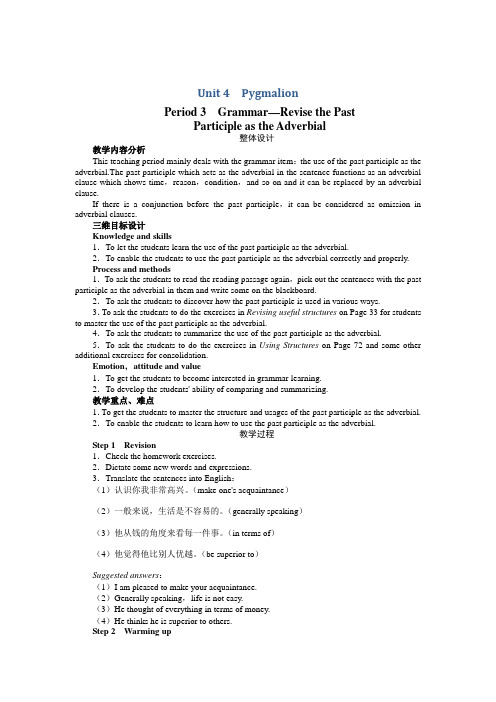
Unit 4PygmalionPeriod 3Grammar—Revise the PastParticiple as the Adverbial整体设计教学内容分析This teaching period mainly deals with the grammar item:the use of the past participle as the adverbial.The past participle which acts as the adverbial in the sentence functions as an adverbial clause which shows time,reason,condition,and so on and it can be replaced by an adverbial clause.If there is a conjunction before the past participle,it can be considered as omission in adverbial clauses.三维目标设计Knowledge and skills1.To let the students learn the use of the past participle as the adverbial.2.To enable the students to use the past participle as the adverbial correctly and properly.Process and methods1.To ask the students to read the reading passage again,pick out the sentences with the past participle as the adverbial in them and write some on the blackboard.2.To ask the students to discover how the past participle is used in various ways.3.To ask the students to do the exercises in Revising useful structures on Page 33 for students to master the use of the past participle as the adverbial.4.To ask the students to summarize the use of the past participle as the adverbial.5.To ask the students to do the exercises in Using Structures on Page 72 and some other additional exercises for consolidation.Emotion,attitude and value1.To get the students to become interested in grammar learning.2.To develop the students' ability of comparing and summarizing.教学重点、难点1.To get the students to master the structure and usages of the past participle as the adverbial.2.To enable the students to learn how to use the past participle as the adverbial.教学过程Step 1Revision1.Check the homework exercises.2.Dictate some new words and expressions.3.Translate the sentences into English:(1)认识你我非常高兴。
高考英语大一轮复习 Unit 4 Pygmalion教案(含解析)新人教版选修8-新人教版高三选修8
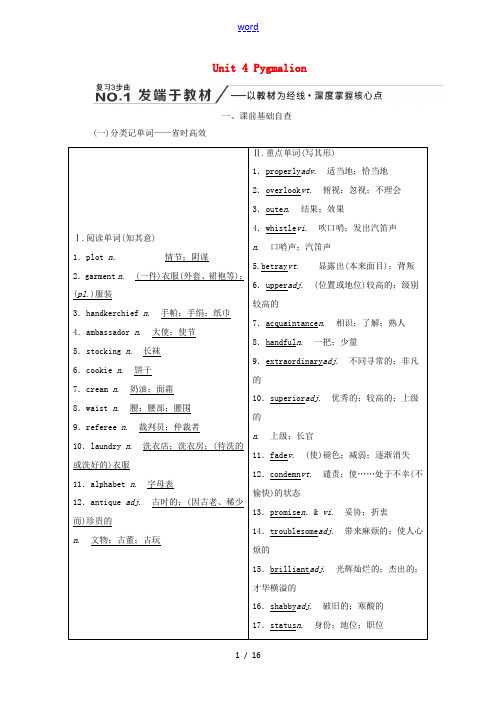
Unit 4 Pygmalion一、课前基础自查(一)分类记单词——省时高效Ⅰ.阅读单词(知其意)1.plot n.情节;阴谋2.garment n. (一件)衣服(外套、裙袍等);(pl.)服装3.handkerchief n. 手帕;手绢;纸巾4.ambassador n. 大使;使节5.stocking n. 长袜6.cookie n. 饼干7.cream n. 奶油;面霜8.waist n. 腰;腰部;腰围9.referee n. 裁判员;仲裁者10.laundry n. 洗衣店;洗衣房;(待洗的或洗好的)衣服11.alphabet n. 字母表12.antique adj. 古时的;(因古老、稀少而)珍贵的n. 文物;古董;古玩Ⅱ.重点单词(写其形)1.properly adv. 适当地;恰当地2.overlook vt. 俯视;忽视;不理会3.oute n. 结果;效果4.whistle vi. 吹口哨;发出汽笛声n. 口哨声;汽笛声5.betray vt. 显露出(本来面目);背叛6.upper adj. (位置或地位)较高的;级别较高的7.acquaintance n. 相识;了解;熟人8.handful n. 一把;少量9.extraordinary adj. 不同寻常的;非凡的10.superior adj. 优秀的;较高的;上级的n. 上级;长官11.fade v. (使)褪色;减弱;逐渐消失12.condemn vt. 谴责;使……处于不幸(不愉快)的状态13.promise n.& vi. 妥协;折衷14.troublesome adj. 带来麻烦的;使人心烦的15.brilliant adj. 光辉灿烂的;杰出的;才华横溢的16.shabby adj. 破旧的;寒酸的17.status n. 身份;地位;职位(二)练中记短语——记牢用活the outro (尾曲) there.8.She expressed her wish to visit the attractiononce_more.(三)仿写明句式——以用为本教材原句句式解读句式仿写1.Will that be of any use toyou?那对你有用吗?be of+抽象名词。
人教版高中英语选修8全册教案
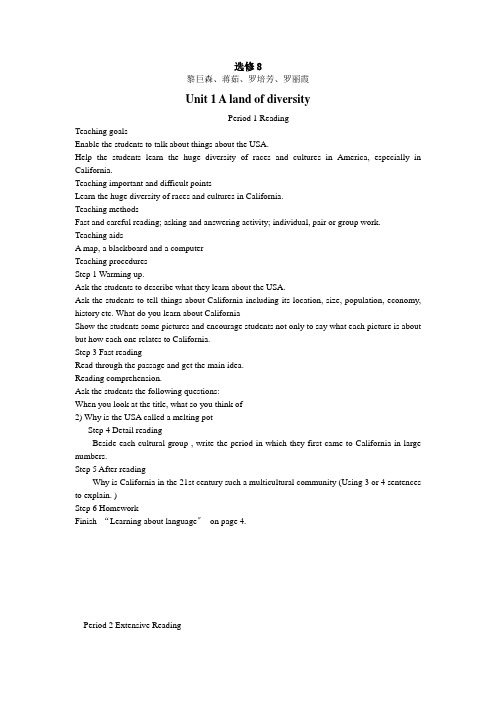
选修8黎巨森、蒋茹、罗培芳、罗丽霞Unit 1 A land of diversityPeriod 1 ReadingTeaching goalsEnable the students to talk about things about the USA.Help the students learn the huge diversity of races and cultures in America, especially in California.Teaching important and difficult pointsLearn the huge diversity of races and cultures in California.Teaching methodsFast and careful reading; asking and answering activity; individual, pair or group work. Teaching aidsA map, a blackboard and a computerTeaching proceduresStep 1 Warming up.Ask the students to describe what they learn about the USA.Ask the students to tell things about California including its location, size, population, economy, history etc. What do you learn about CaliforniaShow the students some pictures and encourage students not only to say what each picture is about but how each one relates to California.Step 3 Fast readingRead through the passage and get the main idea.Reading comprehension.Ask the students the following questions:When you look at the title, what so you think of2) Why is the USA called a melting potStep 4 Detail readingBeside each cultural group , write the period in which they first came to California in large numbers.Step 5 After readingWhy is California in the 21st century such a multicultural community (Using 3 or 4 sentences to explain. )Step 6 HomeworkFinish “Learning about language〞on page 4.Period 2 Extensive ReadingTeaching aims: 1. Improve Ss’ ability of reading2. 德育目的:理解美国多元文化,进一步培育学生跨文化交际意识,为终身学习奠定良好根底。
人教版高中英语选修8Unit4《Pygmalion》word教案
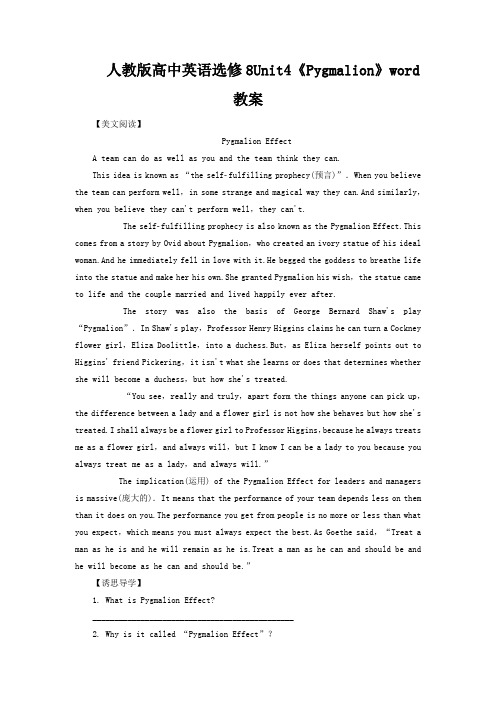
人教版高中英语选修8Unit4《Pygmalion》word教案【美文阅读】Pygmalion EffectA team can do as well as you and the team think they can.This idea is known as “the selffulfilling prophecy(预言)”.When you believe the team can perform well,in some strange and magical way they can.And similarly,when you believe they can't perform well,they can't.The selffulfilling prophecy is also known as the Pygmalion Effect.This comes from a story by Ovid about Pygmalion,who created an ivory statue of his ideal woman.And he immediately fell in love with it.He begged the goddess to breathe life into the statue and make her his own.She granted Pygmalion his wish,the statue came to life and the couple married and lived happily ever after.The story was also the basis of George Bernard Shaw's play “Pygmalion”.In Shaw's play,Professor Henry Higgins claims he can turn a Cockney flower girl,Eliza Doolittle,into a duchess.But,as Eliza herself points out to Higgins' friend Pickering,it isn't what she learns or does that determines whether she will become a duchess,but how she's treated.“You see,really and truly,apart form the things anyone can pick up,the difference between a lady and a flower girl is not how she behaves but how she's treated.I shall always be a flower girl to Professor Higgins,because he always treats me as a flower girl,and always will,but I know I can be a lady to you because you always treat me as a lady,and always will.”The implication(运用) of the Pygmalion Effect for leaders and managers is massive(庞大的).It means that the performance of your team depends less on them than it does on you.The performance you get from people is no more or less than what you expect,which means you must always expect the best.As Goethe said,“Treat a man as he is and he will remain as he is.Treat a man as he can and should be and he will become as he can and should be.”【诱思导学】1. What is Pygmalion Effect?______________________________________________2. Why is it called “Pygmalion Effect”?______________________________________________【答案】 1.It means that when you believe the team can perform well,in some strange and magical way they can.And similarly,when you believe they can't perform well,they can't.2.It is based on the George Bernard Shaw's play “Pygmalion”.Period ⅠPreviewing(教师用书独具)●教学目标本课时要紧是通过学生对学案所给出的内容的学习,了解本课文中所显现的词汇,初步了解课文以及相关的背景知识,为下一堂课对课文的全面明白得起到一个铺垫作用。
英语选修8Unit4__Period2__Learning__about__language优秀学案
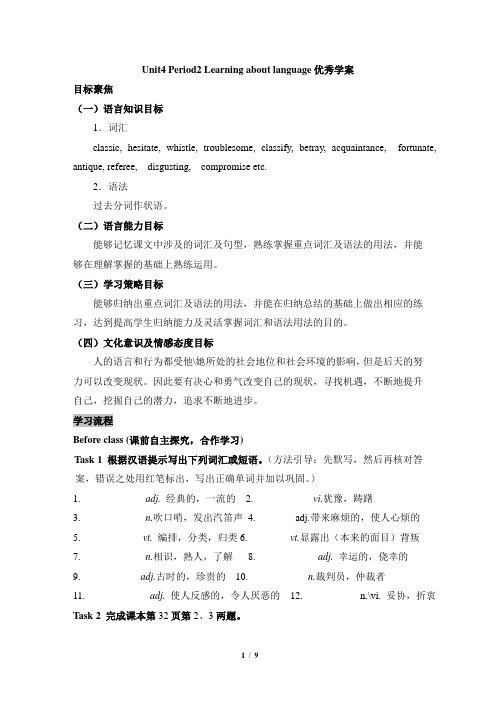
Unit4 Period2 Learning about language优秀学案目标聚焦(一)语言知识目标1.词汇classic, hesitate, whistle, troublesome, classify, betray, acquaintance, fortunate, antique, referee, disgusting, compromise etc.2.语法过去分词作状语。
(二)语言能力目标能够记忆课文中涉及的词汇及句型,熟练掌握重点词汇及语法的用法,并能够在理解掌握的基础上熟练运用。
(三)学习策略目标能够归纳出重点词汇及语法的用法,并能在归纳总结的基础上做出相应的练习,达到提高学生归纳能力及灵活掌握词汇和语法用法的目的。
(四)文化意识及情感态度目标人的语言和行为都受他\她所处的社会地位和社会环境的影响,但是后天的努力可以改变现状。
因此要有决心和勇气改变自己的现状,寻找机遇,不断地提升自己,挖掘自己的潜力,追求不断地进步。
学习流程Before class (课前自主探究,合作学习)Task 1 根据汉语提示写出下列词汇或短语。
(方法引导:先默写,然后再核对答案,错误之处用红笔标出,写出正确单词并加以巩固。
)1. ____________ adj.经典的,一流的2. ___________ vi.犹豫,踌躇3. ____________ n.吹口哨,发出汽笛声4. _______ adj.带来麻烦的,使人心烦的5. ____________vt.编排,分类,归类6. ________vt.显露出(本来的面目)背叛7. ____________ n.相识,熟人,了解8. ____________adj.幸运的,侥幸的9. ___________ adj.古时的,珍贵的10. ___________ n.裁判员,仲裁者11. ____________ adj.使人反感的,令人厌恶的12. ___________n.\vi. 妥协,折衷Task 2 完成课本第32页第2、3两题。
2019-2020年高中人教版英语选修8教学案:Unit4SectionⅢGrammar—过去分词(短语)作状语(含答案)
2019-2020年高中人教版英语选修8教学案:Unit 4 Section Ⅲ Grammar —过去分词(短语)作状语(含答案)语法图解探究发现①Now once taught by me, she'd become an upper class lady ...②But, sir, (proudly) once educated to speak properly, that girl could pass herself off in three months as a duchess at an ambassador's garden party.③Although wounded all over, the brave soldiers continued to fight.④Lost in the forest, you should first of all remain where you are, waiting for help to come.⑤Seriously injured, he had to be taken to hospital.⑥Followed by his wolf-dog, the hunter walked slowly in the forest.⑦He was found lying on the ground, his hands tied.[我的发现](1)句①~⑥中的过去分词分别在句中作条件状语、条件状语、让步状语、时间状语、原因状语和方式状语。
(2)过去分词表示被动或已经完成的动作。
作状语时,可以单独使用,如句④、句⑤、句⑥;也可以在其前面加上适当的连词,如句①、句②和句③。
(3)过去分词的逻辑主语必须与句子的主语保持一致,如果不一致,我们常在过去分词前加上其逻辑主语,构成独立主格结构,如句⑦。
一、过去分词(短语)作状语过去分词(短语)表示被动,表示动作已经完成,其逻辑主语则为句子的主语。
高中英语 Unit 4 Pygmalion英美文化欣赏(教师用书)教案 新人教版选修8-新人教版高二
Unit 4 Pygmalion[导读] 《窈窕淑女》是一部酷似灰姑娘的喜剧,萧伯纳用风趣和幽默的手法,对资产阶级虚伪性进行揭露和辛辣讽刺。
该剧被布鲁克斯称为“本世纪最优秀之音乐歌舞剧〞,曾经荣获托尼奖,被纽约戏剧评论界和外部评论界评为1956年最正确歌舞剧。
在纽约和伦敦,此剧上座率居高不下,胜过同期上演的任何一出百老汇戏剧。
TESTING ELIZAH=Higgins CP=Colonel PickeringE=Eliza MH=Mrs HigginsM=Maid C=Clara F=Freddy N=NarratorN:Eliza's first test is a tea party at Henry's mother's house.H:Well,hello,mother!This is Colonel Pickering,and this is Eliza.CP:Good afternoon,Mrs Higgins.E:(slowlyandcarefully) Good afternoon,Mrs Higgins.MH:(toboth) Good afternoon.(murmurs) Now Henry,how is your experiment ing along?H:Well,mother well.M:(announcesloudly) Here is Mr and Miss Hill!MH:Good afternoon,Freddy and Clara.It's so good of you to e.Let me introduce you to Miss Eliza Doolittle,my son Henry,and his friend Colonel Pickering.F:How do you do?(shakeshandswitheveryone)H:Delighted I'm sure.N:Eliza talks to Clara and Freddy while the others listen.E:(verycarefully)How do you do,Mr Hill and Miss Hill?C:Good afternoon.May I call you Eliza and do please call me Clara.How pretty you look!F:Yes,indeed.May I sit next to you,Eliza?E:Oh yes.Please do.F:Now,will it rain,do you think?E:There are indications that the rain to the west of these islands is likely to move to the east.F:Oh,how funny!E:(crossly) What's wrong with that,young man?I bet I got it right.C:I hope it won't turn cold though.There's so much flu about.E:My aunt died of flu,so they said.But I believe they done the old woman in.C:Done her in?Please what does that mean,Mr Higgins?H:Oh,that's the new small talk.To do a person in means to kill them.E:(continuing)Yes,why should she die of influenza?She recovered from diphtheria the year before.I believe they done her in.C:(turningtoEliza) Do you mean that?E:(gettingenthusiastic)Yes,I do! What became of her new straw hat that she promised to me?Somebody stole it,and what I say is:the person who stole it,done her in.Her family would have killed her for a hatpin,let alone a hat!F:(can'thelplaughing) I like the new small talk.E:(angrily) If that was right,why were you laughing?Have I said anything I oughtn't,Mrs Higgins?MH:Not at all.E:Well,what I say is...H:(lookingathiswatch)Ahem!E:(takingthehintandrising)Well,I must go.So pleased to have met you.Goodbye.MH:Goodbye.F:May I walk you home?E:Walk?Not likely!I'm going in a taxi!(exits)(FreddyandClaraalsorise) C:It's time for us to leave.Thank you,Mrs Higgins.MH:It's been my pleasure.See you next week then?(exittheHills)H:Now,mother,do you think she is ready for the ambassador's garden party?MH:You silly boy.Of course not.She looks all right,of course.But she gives herself away with every sentence she speaks!H:Never mind about that!Pickering and I will just have to work a little harder.Do you think,Pickering,we should take her to the theatre?CP:Yes,what a good idea!But do you think she'll...(fadeoutastheyleavethehouse)测试伊莱扎旁白:伊莱扎的第一次测试是在亨利的母亲家里举办的茶会。
2021-2022学年高中英语译林版选修8教学案:Unit 4 Section 4 Word版含答案
强调[语法初识]原句感知自主探究①It was Mary who did the experiment in the labyesterday evening.②It was in the park that I met my old teacheryesterday.③It is a pity that you didn't see the film yesterdayevening.④It was seven o'clock when we reached themountain village.⑤It was yesterday that I met my old teacher in thepark.⑥It was my old teacher that I met in the parkyesterday.⑦Maria, do tell us a little about the Venice FilmFestival.⑧It is a good idea that we will have a swim thisSunday. (1)以上各句中,句①②⑤⑥⑦表示强调。
(2)上述句子中表示强调有两种表现形式。
一种是用do/does/did+动词原形表示;另一种是用强调句型表示。
(3)句③中的that引导主语从句,it是形式主语。
同样用法的还有句⑧。
(4)句④中的it是代词;when引导时间状语从句。
[语法剖析]强调的功能和作用在表达中,强调是对句中的主语、宾语、状语或状语从句进行充分强调而接受的一种特殊的表达结构,强调是一种修辞方法,能起到突出信息的作用。
语法点一强调句型1.强调句型的基本结构I came across Jim in the park yesterday.→It was I that/who came across Jim in the park yesterday.(强调主语)→It was Jim that/who I came across in the park yesterday.(强调宾语)→It was in the park that I came across Jim yesterday.(强调地点状语)→It was yesterday that I came across Jim in the park.(强调时间状语)昨天我在公园偶然遇到了吉姆。
高中英语Unit4Filmsandfilmevents英美文化欣赏教案(含解析)牛津译林版选修8
Unit 4 Films and film events【导读】当演员是多少人孩提时期的梦想。
人们通常以为演员代表的是光鲜、美丽与富有,但真的是那样吗?【节选】PicturesEight o'clock in the morning.Miss Ada Moss lay in her narrow bed,staring up at the ceiling.Her room,which was right at the top of a tall house in Bloomsbury,smelled of wet clothes and face powder and the bag of fried potatoes she had brought in for supper the night before.‘Oh dear,’thought Miss Moss.‘I am cold.I wonder why I always wake up so cold in the mornings now.My knees and feet and my back—especially my back—are like ice.And I was always so warm in the old days.It isn't because I'm thin.I'm just as wellcovered as I always was.No,it's because I don't have a good hot dinner in the evenings.’She imagined a row of good hot dinners passing across the ceiling,each with a bottle of good strong beer.‘I'd like to get up now,’she thought,‘and have a big sensible breakfast.’Pictures of big sensible breakfasts followed the good hot dinners across the ceiling.Miss Moss pulled the blanket up over her head and closed her eyes.Suddenly,her landlady burst into the room.‘There's a letter for you,Miss Moss.’‘Oh,’said Miss Moss,in a voice which was much too friendly,‘thank you very much,Mrs Pine.It's very good of you to bring me my letters.’‘Oh,it's nothing,’said the landlady.‘I hope it's the letter that you've been waiting for.’‘Yes,’said Miss Moss brightly,‘yes,perhaps it is.I wouldn't be surprised.’‘Well,I'd be very surprised,’said the landlady.‘That's the truth.And can you open it right now,please?A lot of landladies wouldn't even ask—they'd just open it themselves.Things can't go on like this,Miss Moss,indeed they can't.First you tell me you've got the money to pay your rent,then you say you haven't,then there's a letter lost in the post or a theatre manager who's gone to Brighton but will be coming back soon—I'm sick and tired of it all,and I've had enough.At a time like this,too,with the price of everything skyhigh and my poor boy away at the war in France!If you can't pay your rent,there's plenty of other people who wouldgive me good money for a room like this.As my sister Eliza was saying to me only yesterday,Miss Moss,I've been much too softhearted with you!’Miss Moss did not seem to be listening to this.She tore open the letter.It was from a film company.‘No suitable parts for a lady of your experience at present,’she read.She stared at it for a long time before she spoke to her landlady.‘Well,Mrs Pine,’she said.‘I think you'll be sorry for what you've just said.This is from a theatre manager who wants to see me immediately about a part in a new musical show.’But the landlady was too quick for her.She tore the letter out of Miss Moss's hand.‘Oh is it,is it indeed!’she cried.‘Give me back that letter.Give it back to me at once,you bad,wicked woman,’cried Miss Moss.She could not get out of bed because she had a hole in her nightdress.‘Well,Miss Moss,’said the landlady,‘if I don't get my money by eight o'clock tonight,you can get out of my house,my Lady.’The door banged and Miss Moss was alone.She threw back the bedclothes,and sat on the side of the bed,shaking with anger and staring at her fat white legs.‘The old cat,’she said,‘the rotten old cat!’Then she began to pull on her clothes.‘Oh,I wish I could pay that woman!Then I'd tell her what I think of her!’She suddenly saw her face in the mirror,and gave herself a little smile.‘Well,old girl,’she said,‘you're in trouble this time,and no mistake.’But the person in the mirror stopped smiling.‘You silly thing,’said Miss Moss.‘It's no good crying.You'll make your nose all e on!Get dressed,and go out and find a job.That's what you've got to do.’She picked up her bag and shook it.A few small coins fell out.‘I'll have a nice cup of tea at an ABC café before I go anywhere,’she decided.‘I've got enough money for that.’Ten minutes later,a large lady in a blue dress and a black hat covered in purple flowers looked at herself in the mirror,and sang:‘Sweetheart,remember that hope never diesAnd it al—ways is dark—est before sunrise.’But the person in the mirror wouldn't smile at her,and Miss Moss went out.When she came to the ABC café,the door was open. A man was carrying boxes of bread in,and two waitresses were combing their hair and talking.‘My young man came home from France last night,’one of the girls sang happily.‘Oh,I say!How topping for you!’cried the other.‘Yes,wasn't it!He brought me a sweet little brooch.Look,it's got“Dieppe”written on it.’‘Oh,I say!How topping for you!’The man with the boxes of bread came in again,almost knocking Miss Moss over.‘Can I have a cup of tea,please?’she asked.But the waitress went on combing her hair.‘Oh,’she sang,‘we're not open yet.’She turned to the other girl.‘Are we,dear?’‘Oh,no,’said the other waitress.Miss Moss went out.‘I'll go to Charing Cross,’she decided.‘That's what I'll do.And I'll have coffee,not tea.Coffee's more filling.Those girls!Her young man came home;he brought her a brooch...’She began to cross the road.‘Look out,Fatty!’shouted a taxidriver.Miss Moss pretended not to hear.‘No,I won't go to Charing Cross,’she decided.‘I'll go straight to Kig and Kadgit.They open at nine.If I get there early,Mr.Kadgit may have something for me...“I'm so glad to see you,Miss Moss.I've just heard from a manager who wants a lady...exactly the right part for you...three pounds a week...go and see him immediately.It's lucky you came so early.”’But there was nobody at Kig and Kadgit except an old woman washing the floor in the passage.‘Nobody here yet,Miss,’the old woman said.‘Oh,isn't Mr.Kadgit here?’said Miss Moss.‘I'll sit down and wait for him,if I may.’‘You can't wait in the waitingroom,Miss.I haven't cleaned it yet.Mr.Kadgit never comes in before eleven thirty on a Saturday.Sometimes he doesn't come in at all.’‘How silly of me,’said Miss Moss.‘I forgot it was Saturday.’‘Mind your feet,please,Miss,’said the old woman.And Miss Moss was out in the street again.The nice thing about Beit and Bithem was—it was always crowded.You walked into the waitingroom and you met everybody you knew.The early ones sat o n chairs,andthe later ones sat on the early ones' knees,while the men stood around the walls,talking and joking with the ladies.‘Hello,’said Miss Moss,in her friendly way.‘Here we are again!’And young Mr.Clayton did a couple of dancesteps and sang:‘Wai ting for the Robert E.Lee!’‘Mr.Bithem here yet?’asked Miss Moss,powdering her nose.‘Oh,yes,dear!’cried all the girls together.‘He's been here for ages.We've been waiting for more than an hour!’‘Oh dear,’said Miss Moss.‘Any work for us,do you think?’‘Oh,a few jobs in Africa,’said young Mr.Clayton.‘A hundred and fifty a week for two years,you know.’‘Oh!’cried the girls.‘Isn't he a scream?Isn't he too funny?’A dark girl with a sad face touched Miss Moss on the arm.‘I just missed a lovely job yesterday,’she said.‘Six weeks on tour,and then the West End. The manager said I would have got it if I'd been a bit strongerlooking.He said the part was made for me—only I'm too thin.’She stared at Miss Moss,and the dirty,dark red rose on her hat looked as sad and disappointed as she was.‘Oh,dear,that was awfully bad luck,’Miss Moss said,trying hard not to sound too interested.‘What was the show called,may I ask?’But the sad,dark girl understood what Miss Moss wanted,and a mean look came into her heavy eyes.‘Oh,it wasn't a part for you,my dear,’she said.‘He wanted someone young,you know,a dark Spanish type like me.I was too thin,that was the only problem.The door opened and Mr.Bithem appeared.He kept one hand on the door,and held up the other for silence.‘Look he re,ladies’—and here he paused and gave them his famous smile—‘and all you boys,’They all laughed loudly at that.‘I've got nothing for you this e back on Monday.I'm expecting several phone calls on Monday.’Miss Moss pushed desperately through th e crowd.‘Mr.Bithem,I wonder if you've had any news from...’‘Now,let me see,’said Mr.Bithem slowly,staring at her.He had seen Miss Moss four times a week for—how many weeks was it?‘Now,who are you?’‘Miss Ada Moss.’‘Oh yes,yes;of course,my dear.Not yet,my dear.Now I had a call for twentyeightladies today,but they had to be young and able to kick their legs up a e back the week after next—there'll be nothing before that.’电影早上8点钟。
- 1、下载文档前请自行甄别文档内容的完整性,平台不提供额外的编辑、内容补充、找答案等附加服务。
- 2、"仅部分预览"的文档,不可在线预览部分如存在完整性等问题,可反馈申请退款(可完整预览的文档不适用该条件!)。
- 3、如文档侵犯您的权益,请联系客服反馈,我们会尽快为您处理(人工客服工作时间:9:00-18:30)。
一、词汇拓展1.适应,改编v.____________;适应,改编本n.____________;能适应的adj.___ __________ 2.误会n. &v.________;(过去式)________;(过去分词)________;错误的adj.________ 3.恐怖,恐惧n.__________;可怕的,恐怖的adj.__________;可怕地adv.__________ 4.犹豫,踌躇v._________________;犹豫,迟疑n.________________5 编排,分类v._____________;编排,分类n._____________6.使作呕,反感,厌恶v.________;使人反感的adj.________;感到反感的adj.________7. ___________ n. 舒适; 安慰vt. 安慰_____________ adj. 不舒服的; 不安的8. _______n. 羊毛; 毛线; 毛织品_______ adj. 毛纺的; 纯毛的9. ________ adj. 经典的n. 经典著作_______ adj. 古典的, 典雅的, 经典的二、短语(从Reading 1 和 Reading 2 中找出以下短语)1. (某人)冒充…____________________2. 结识,与…相见___________________3. 惊愕地_________________________4. 一般来说________________________5. 就…来说,从…角度 ______________6. 带…进来________________________7. 几天前 _________________________ 8. 带走,拿走_____________________9. 需要 _____________________ 10.透露身份,显露(本来面目)____________11. 伪装, 乔装 _________________ 12. 毫不犹豫 ____________________13. 把..误认为 _________________ 14. 要是…怎么办 ________________15. 优于… _____________________ 16. 打赌 ________________________17. 注定… _____________________ 18. 使…相信… ___________________19.采取有效措施 _____________________ 20. 根据…把..分类 ________________ 21. (声音、画面)逐渐模糊_____________ 22.用…的声音___________________23.自以为是 _______________________ 24. 移交 ______________________三、语言点1. adaptation n. 改编本;适应性adaptation to 对……的适应adapt vt.使适应(合);修改,改编 vi. (to)适应adapt oneself to 使适应;使适合1)这部戏剧是一部短篇小说的改编本。
___________________________________________________________.2)动物对环境的适应是相当慢的。
___________________________________________________________.3)He tried hard to______________________(使自己适应) the new conditions.4)He made a quick ____________________(适应) the new environment.5)When they moved to Canada, the children _____________(适应) the change very well.2. hesitate vi. 犹豫;踌躇(1)hesitate to do sth.迟疑做某事,不愿做某事hesitate about/in/at/over (doing) sth.(做)某事犹豫不决hesitate about+疑问词+to do sth.做某事犹豫不决(2)hesitation n.踌躇,犹豫without hesitation毫不犹豫地have no hesitation in doing sth.毫不犹豫地做某事1.完成句子(1)____________________________(对于那件事不要再犹豫了).Do it at once.(2)____________________(尽管和我联系,别犹豫) if you need any more information.(3)I would __________________________________(毫不犹豫地拒绝这个职位).(4)__________________ (毫不犹豫地),Meng Xiangbin jumped into the river to save thedrowning young woman.3.mistaken adj, 在句中作表语或前置定语。
作表语be mistaken about… 对某事持错误的见解m istake …for…把…误认为…(take for)1.完成句子(1) ________________________________________________.你对他所说的误解了。
(2)____________________________________________.人们对这个孩子有不对的看法。
4. betray vt. 背叛(某人);出卖(国家,朋友)给…;泄露秘密betray ...to ... 出卖(国家,朋友)给…betray oneself 无意中露出本性betrayer n. 背叛者,告密者betrayal n. 背叛,卖国an act of betrayal 背叛行为(1)他不该出卖国家给敌人。
________________________________________________.(2)他们一张开嘴就露了陷。
They ________________________ every time they open their mouths.(3)他的脸显露出他很生气。
________________________________________________.4)He ___________________(透露了这个消息)to all his friends.5. condemn vt. 责难;责备;谴责某人;判处…有罪condemnation n. 责难;判罪condemn sb./sth. as 谴责/指责某人/某事为…condemn sb. to sth. 判处某人某种刑罚condemn sb. to do sth. 把…逼入某状态,使某人注定…be condemned/sentenced to death 被判处死刑condemn sb’s behaviour 谴责某人的举动1)She knew that society would _____________(指责) her for leaving her children.2)There was widespread international ________________(国际谴责) of the bombing.3)He was found guilty and ______________________________. (判处死刑)4)我们谴责他的愚蠢行为。
_____________________________________________.5)那个罪犯被判处死刑。
________________________________________________.6. pass sb. off as... 把某人改变或冒充成…联想拓展:pass sth. to sb. 将某物递给某人 pass away 去世pass down/on... 把…传给后世 pass...on to 把…传递给…pass by 走过;经过 pass through 通过;穿过pass out昏倒,失去知觉用适当的介词或副词填空1)Pass the book ________me when you have finished it.2)I was sorry to learn that his mother had passed __________ .3)She passed _____________a difficult period after her marriage failed.4)They bought up pieces of old furniture and passed them __________valuable antiques.5)She _____________at the sight of a snake on her bed.6)他冒充警卫逃走了。
___________________________________________________.7)她把他假充作自己的丈夫。
_____________________________________________.7. acquaintance n.相识;熟悉;熟知 n.相识的人,熟人make one’s acquaintance=make the acquaintance with sb. 结识某人acquaint vt. 使熟知,告知acquaint sb. with ... 使某人认识/了解…have some/an acquaintance with 对……有了解acquaint oneself with=be familiar with 对……熟悉have no acquaintance with 不熟悉,不了解pick acquaintance with 偶然结识[认识]根据句子的意思在横线上填入适当的词1)The musician had little acquaintance _________ modern science.2)I am delighted to ___________ your acquaintance.3)She has many ___________________ in the business community.4)I have some acquaintance _____________ Spanish.5)I need to _________________ myself with the new regulations.6)我懂一点俄语。
